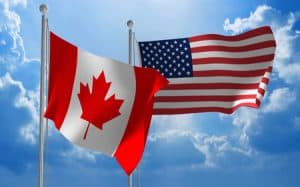March 7, 2017 – Officials from Canada and the U.S. met at a summit in Montreal recently to discuss the problem of asylum seekers crossing the border hoping to become refugees in Canada.
A Reuters report says the meeting included representatives from the Royal Canadian Mounted Police (RCMP), the Canada Border Services Agency (CBSA), the U.S. Department of Homeland Security (DHS) and U.S. Customs and Border Protection (CBP).
The officials are understood to be working on a plan aimed at tackling the problem of people crossing from America to claim the status of refugees in Canada to flee President Donald Trump’s crackdown on USA immigration.
Read More
Manitoba Sees Surge In Illegal Border Crossings From U.S.
FAQ: Donald Trump’s U.S. Immigration Ban Executive Order
Immigrants In U.S. Are Crossing Quebec Border Illegally
 Canada says the majority of those crossing the border are in possession of U.S. visas, preferring to risk arrest here and try to become refugees in Canada rather than remain south of the border where they have legal status.
Canada says the majority of those crossing the border are in possession of U.S. visas, preferring to risk arrest here and try to become refugees in Canada rather than remain south of the border where they have legal status.
Although the numbers making the risky journey are currently quite low – perhaps under 1,000, although firm statistics are hard to come by – the problem is expected to get worse as the weather improves.
Given current numbers, the U.S. considers the problem more as an embarrassment rather than any kind of threat, according to a Reuters source.
DHS chief John Kelly is due to come to Canada in March 2017 for talks on the problem, although this visit is unconfirmed.
Canada has also sought to play down the matter, with Immigration Minister Ahmed Hussen saying the numbers are so low that a trend is yet to be established.
“We need to see what happens over the next little while to see if this is a trend,” Hussen told CTV recently. “We can’t really determine that this is a trend moving forward.”
However, Prime Minister Justin Trudeau is under pressure from both sides – to let people in and provide refugee protection and to ensure they do not present a security risk.
Border towns Manitoba, Quebec and British Columbia have all reported increases in illegal crossings.
Immigrants no longer feel welcome in the U.S., they are looking for an escape route, and become refugees in Canada appears to be top the chosen destination for many.
On one day in February, RCMP officers picked up 19 asylum seekers who had crossed the border near Emerson, Manitoba.
When the officers tried to hand them over to the CBSA, they were told there was no room. An Emerson municipality official had to open up the town hall to provide shelter to the would-be refugees.
CBSA figures show a marked increase in these illegal border crossings in the last three years.
The 2013-2014 fiscal year saw 68 cases, 2015-2016 saw 321 and there have been 403 already this fiscal year, ending March 30.
The issue has raised questions around the Safe Third Country Agreement, signed by both Canada and the U.S.
It means asylum seekers who claim refugee status in one country cannot simply hop to the next if they are rejected.
This means they would be turned down immediately if they turned up at an official U.S.-Canada border crossing.
However, if they make it across the border, they are checked for medical conditions and then the majority make a request for refugee status, after which they are seen by a judge within two months. Around 60 per cent of those hearings result in the subject being given refugee status in Canada.
Manitoba is not the only border province to see an increase in numbers crossing into Canada illegally.
Five times the number of people entered Quebec from the U.S. illegally in 2016 compared to the previous year, again according to CBSA figures. More than 1,200 claimed refugee status in Canada in 2016.
Syrians, Sudanese and Yemenis are the main nationalities, creating the impression that U.S. immigrants are fleeing Trump’s crackdown.
Interested employers: Kindly contact us here to receive further information.
Interested candidates: Find out whether you qualify to Canada by completing our free on-line evaluation. We will provide you with our evaluation within 1-2 business days.
Read more news about Canada Immigration by clicking here.


